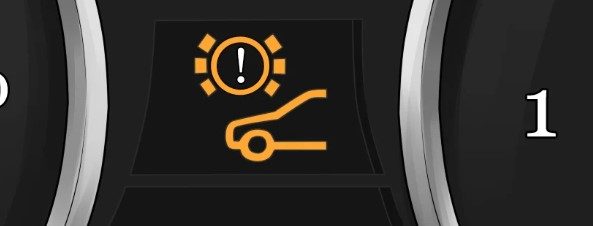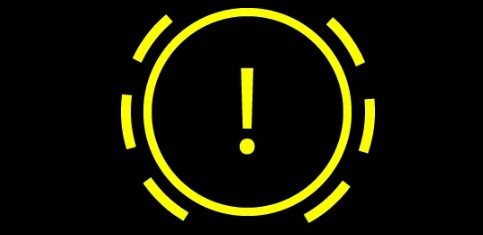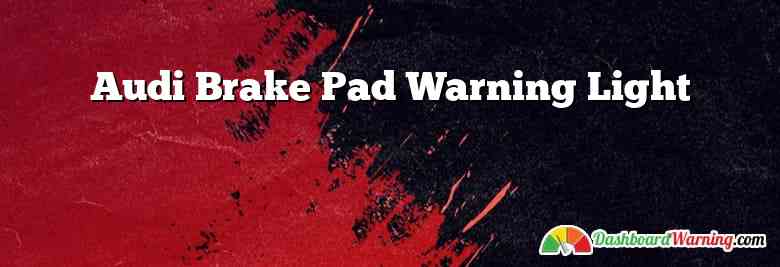Have you ever seen an Audi Brake Pad Warning Light on the dashboard? If so, you’re not alone. This warning light is standard on Audi vehicles made in the past few years, and it refers to a potential problem with your brake pads. If you’re not sure what this light means or how to fix it, read on to learn more about Audi brake pad warnings and what you can do if you get one.
📢Read also: Audi A3 Trouble Code P174a00
What is an Audi Brake Pad Warning Light?

An Audi Brake Pad Warning Light will come on if the brake pads need to be replaced. This warning light is an indication that the brake pads are not reaching their maximum performance.
The brake pad warning light is a dashboard indicator that illuminates when the brake pads have worn down to a certain point. When this happens, it's time to replace the brake pads. The light may also come on if there is a problem with the brakes, such as low fluid levels or a leak in the system.
When this light comes on, it means that your brake pads need to be replaced. The good news is that this repair can be done quickly and easily. However, if you ignore the warning light, it can lead to more severe problems down the road.
🚨You may be interested in: Audi A4 Trouble Code P150a00
What Do I Do If the Audi Brake Pad Warning Light Comes On?

If you get the Audi brake pad warning light, there are a few things you can do to try and fix the problem. First, make sure you have enough brake fluid in your system. Next, try bleeding the brakes by forcing air into the system until the warning light goes off. If neither of these remedies works, it may be time to replace your Audi's brake pads, and all you need to do is take your Audi in for service.
📢Read also: Audi Brake Fluid Warning Light
How to Fix an Audi Brake Pad Warning Light

If you're experiencing a brake pad warning light on your Audi, there are several things you can do to fix the issue.
The first step is to determine if the warning light is actually coming from the brake pads or the hydraulic system. To do this, you'll need to unbolt the front and rear wheel hubs and take a look at the brake pads themselves. If they're worn down significantly, it's likely that the warning light is related to the pads and not the hydraulic system.
⚡️Other article: Audi Air Suspension Warning Light
If you determine that the brake pad warning light is coming from the brakes themselves, you'll need to replace them. You can do this yourself or have a mechanic do it for you, but be sure to get a quality set of pads that will last longer.
If however, you determined that the brake pad warning light is coming from somewhere else in your Audi, like in one of the sensors near your wheel hubs, then it's most likely something more serious and needs to be fixed by a technician. In this case, having a mechanic replace all of your brake lines will usually solve the problem.
If your Audi brake pad warning light is on, don't panic. The light will usually turn off when you replace your brake pads. If it doesn't turn off after a few days or if the light stays on, it's likely that there is another issue with your car, and you need to take it in for service. However, if the brake pad warning light is on and you've replaced your brake pads but the problem persists, a more severe problem with your car may require professional attention.
👀Look at this: Audi Sq5 Dashboard Warning Lights, Symbols and Meanings
FAQs About Audi Brake Pad Warning Light
How long can you drive after the brake pad warning light, Audi?
You can drive for a while after the brake pad warning light comes on in your Audi, but it is best to get the pads replaced as soon as possible. Depending on their wear, you may only have a few hundred miles before they need to be replaced.
Can I drive with the brake pad warning light on?
It is not recommended to drive with the brake pad warning light on. This is because it indicates that the brake pads are worn and need to be replaced. Brakes are an essential safety feature of a vehicle, so it is best to get them fixed as soon as possible.
What does it mean when Audi says brake pads?
When Audi says "brake pads", they are referring to the replaceable friction material mounted on metal plates, which are used to create friction and stop the vehicle when the brakes are applied.
How much does it cost to replace Audi brake pads?
The cost to replace Audi brake pads varies depending on the model of Audi but typically ranges from $150-$250.
How long should Audi brake pads last?
Regular inspections are recommended to ensure the longevity of your Audi brakes. Inspections should be done at regular intervals, depending on driving habits and usage patterns; these can range from 30,000 to 70,000 miles. Commuting in heavy traffic or with frequent braking will require more frequent inspections in order to guarantee the optimal performance of your brake pads over time.
What does it mean when Audi says brake pads?
Seeing the Audi brake warning light illuminated on your dashboard instrument cluster is a sign that you need to take action and schedule an appointment for brake repair service. With roughly 1,000 - 3,000 miles remaining before needing new front pads and rotors, it's wise not to delay servicing these components.
Is it normal for Audi brakes to make noise?
This occurrence is fairly common with brand-new Audi vehicles due to the use of high-performance semi-metallic brakes. As these brake pads rub against the metal motors, a squeaking noise may develop, which can be exacerbated by dust accumulation.
Was this page helpful?


More important content about Audi
Audi Q5 Years To Avoid (List of Worst Years)
Audi Check Engine Light - Common Causes
Audi A4 Years To Avoid - 4 Worst Years
Audi Tyre Pressure Warning Light
Audi Brake Fluid Warning Light
Tips and Advice
Porsche Cayenne Years To Avoid
Subaru Legacy Years To Avoid - 5 Worst Years
Pt Cruiser Years To Avoid
Use 5w30 instead of 0w20 - Advantages and Disadvantages
Tractor Dashboard Symbols And Meanings
Suzuki Sx4 Years To Avoid - 5 Worst Years